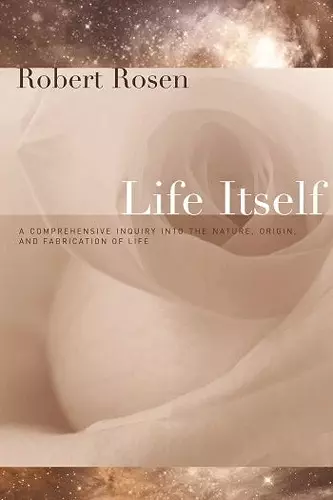Life Itself
A Comprehensive Inquiry Into the Nature, Origin, and Fabrication of Life
Format:Paperback
Publisher:Columbia University Press
Published:22nd Jul '05
Should be back in stock very soon

What is life? For four centuries, it has been believed that the only possible scientific approach to this question proceeds from the Cartesian metaphor-organism as machine. Therefore, organisms are to be studied and characterized the same way "machines" are; the same way any inorganic system is. Robert Rosen argues that such a view is neither necessary nor sufficient to answer the question. He asserts that life is not a specialization of mechanism, but rather a sweeping generalization of it. Above all, Rosen argues that renouncing mechanism does not mean abandoning science. A radical alternative is proposed, drawn equally from experience in biology, physics, and mathematics; an alternative which draws attention to a new class of complex systems, which are radically different from mechanism.
This strategy, derived from Newtonian mechanism, is embodied in reductionism: break what is complicated into simpler pieces, understand the pieces themselves, and reconstruct organisms from this understanding. In Life Itself, Robert Rosen argues that such a view is neither necessary nor sufficient to answer the question.Why are living things alive? As a theoretical biologist, Robert Rosen saw this as the most fundamental of all questions-and yet it had never been answered satisfactorily by science. The answers to this question would allow humanity to make an enormous leap forward in our understanding of the principles at work in our world. For centuries, it was believed that the only scientific approach to the question "What is life?" must proceed from the Cartesian metaphor (organism as machine). Classical approaches in science, which also borrow heavily from Newtonian mechanics, are based on a process called "reductionism." The thinking was that we can better learn about an intricate, complicated system (like an organism) if we take it apart, study the components, and then reconstruct the system-thereby gaining an understanding of the whole. However, Rosen argues that reductionism does not work in biology and ignores the complexity of organisms. Life Itself, a landmark work, represents the scientific and intellectual journey that led Rosen to question reductionism and develop new scientific approaches to understanding the nature of life. Ultimately, Rosen proposes an answer to the original question about the causal basis of life in organisms. He asserts that renouncing the mechanistic and reductionistic paradigm does not mean abandoning science. Instead, Rosen offers an alternate paradigm for science that takes into account the relational impacts of organization in natural systems and is based on organized matter rather than on particulate matter alone. Central to Rosen's work is the idea of a "complex system," defined as any system that cannot be fully understood by reducing it to its parts. In this sense, complexity refers to the causal impact of organization on the system as a whole. Since both the atom and the organism can be seen to fit that description, Rosen asserts that complex organization is a general feature not just of the biosphere on Earth-but of the universe itself.
ISBN: 9780231075657
Dimensions: unknown
Weight: unknown
285 pages